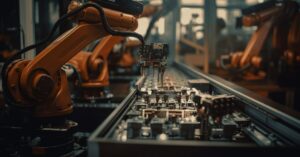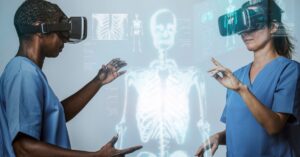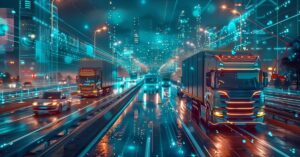How AI Is Changing Jobs in America: What You Need to Know
Introduction
Artificial Intelligence (AI) is reshaping industries, automating tasks, and transforming the way people work. In the U.S., AI is creating new opportunities while also making some jobs obsolete. The impact of AI is significant across multiple sectors, affecting employment, job roles, and career growth.
This article explores how AI is influencing various industries, the risks and benefits it brings, and how workers can adapt to this evolving job market.
The Impact of AI on Different Industries
AI is changing jobs in many ways. Some industries see job losses due to automation, while others experience growth with AI-driven roles. Here’s how AI is impacting different sectors:
1. Manufacturing and Automation
Manufacturing is one of the industries most affected by AI and automation. AI-powered robots now handle repetitive tasks like:
- Assembling products
- Packaging goods
- Quality control inspections
Impact on Jobs:
- Many low-skilled jobs in factories are being replaced by machines.
- However, new jobs are emerging in AI maintenance, robotics engineering, and quality assurance.
2. Healthcare and AI-Powered Diagnosis
AI is revolutionizing healthcare with advanced technology, including:
- AI-driven medical imaging (detecting diseases faster)
- Virtual health assistants (chatbots that answer health-related questions)
- Robotic surgeries (AI-assisted precision surgeries)
Impact on Jobs:
- AI is reducing the workload for doctors and nurses.
- New job roles in AI-assisted healthcare technology are emerging.
- AI cannot replace human empathy, so healthcare professionals remain essential.
image – Freepik
3. Retail and Customer Service
Retail businesses are integrating AI through:
- Self-checkout systems
- AI-powered customer support chatbots
- Inventory management automation
Impact on Jobs:
- Some cashiers and sales assistants are being replaced by self-service kiosks.
- AI is increasing demand for digital marketing and e-commerce specialists.
4. Finance and Banking
Banks and financial institutions use AI for:
- Fraud detection and prevention
- Automated financial planning and investment analysis
- AI-driven customer support
Impact on Jobs:
- AI is replacing traditional bank tellers and customer service representatives.
- Demand for AI specialists, financial data analysts, and cybersecurity experts is growing.
5. Education and AI-Driven Learning
AI-powered learning platforms provide:
- Personalized learning experiences
- AI tutors for students
- Automated grading systems
Impact on Jobs:
- Some administrative roles in education are becoming automated.
- Teachers are adapting by using AI tools to enhance learning.
6. Transportation and Self-Driving Technology
AI is transforming transportation with:
- Self-driving cars and trucks
- AI-based traffic management systems
- Automated delivery drones
Impact on Jobs:
- The trucking and taxi industries may see job losses.
- Demand for AI engineers, vehicle safety experts, and logistics analysts is increasing.
The Benefits of AI in the Job Market
AI is not just replacing jobs; it is also creating new opportunities. Some of the key benefits include:
1. Increased Efficiency and Productivity
AI automates repetitive tasks, allowing companies to focus on strategic decision-making.
2. New Career Opportunities
The rise of AI has led to demand for professionals in:
- AI research and development
- Data science and analytics
- Cybersecurity and ethical AI
3. Improved Work-Life Balance
AI helps automate time-consuming tasks, allowing employees to focus on creative and meaningful work.
4. More Opportunities for Remote Work
AI-powered tools help companies manage remote teams efficiently, increasing flexibility for employees.
Challenges of AI in the Workforce
While AI offers many advantages, there are also concerns:
1. Job Displacement
- Many traditional jobs are being automated, especially in low-skilled sectors.
- Workers need to upskill to stay relevant in the job market.
2. Ethical Concerns and Bias
- AI systems can be biased if they are not properly trained.
- Ethical AI development is crucial to ensure fairness in decision-making.
3. Privacy and Security Risks
- AI handles vast amounts of data, raising privacy concerns.
- Strong cybersecurity measures are necessary to prevent data breaches.
How to Adapt to AI in the Workforce
To stay competitive in an AI-driven job market, employees should:
1. Learn AI-Related Skills
- Take online courses in AI, machine learning, and automation.
- Learn how AI tools are used in your industry.
2. Focus on Human-Centric Skills
AI cannot replace soft skills like:
- Creativity
- Emotional intelligence
- Critical thinking
3. Stay Updated on AI Trends
- Follow AI developments in your industry.
- Adapt to new AI-driven work environments.
4. Embrace Lifelong Learning
- Companies are looking for employees who are willing to adapt and learn.
- Continuous education is key to job security in an AI-powered world.
Conclusion
AI is transforming jobs in America. While it is replacing some roles, it is also creating new career opportunities. Workers who adapt by learning new skills will thrive in an AI-driven job market.
The key to success is understanding AI’s impact and preparing for the future with continuous learning and skill development.
Also Read:
Top Business Trends Shaping the Future of Work in 2025






